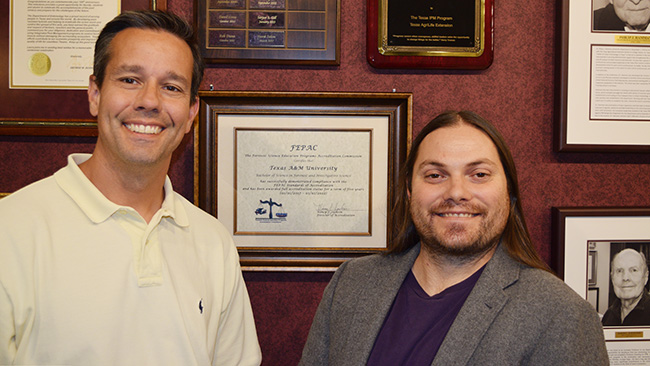
Dr. Jeffery Tomberlin, left, and Dr. Aaron Tarone, right. Photo by Rob Williams
MIAMI, FLORIDA —Two faculty members from the Department of Entomology are taking the lead in Texas A&M’s participation in a newly formed Center for Advanced Research in Forensic Science (CARFS) funded in part by the National Science Foundation (NSF), the National Institute of Justice (NIJ) and its government and industrial partners.
Dr. Jeffery Tomberlin, Texas A&M AgriLife Research Fellow and director of the Texas A&M University Forensic and Investigative Sciences Program in College Station has been named the director for Texas A&M and his colleague, Associate Professor Dr. Aaron Tarone, has been named co-director.
The new center will have two focal points. One based at Florida International University (FIU) draws heavily on faculty expertise at FIU and among its partner institutions, George Washington University and Northeastern University, in the areas of forensic chemistry, forensic microbiology, forensic molecular biology, and forensic psychology. The second foci is led by the University of South Alabama (USA) and Texas A&M who will focus on digital forensics and data analysis as well as microbial and decomposition forensics, respectively.
For Texas A&M University, the new center builds on a strong history of research related to decomposition ecology and applications in the forensic sciences in conjunction with the development of the undergraduate Forensic and Investigative Sciences Program in the Department of Entomology, Tomberlin said. Through these initial efforts in entomology, research has diversified across colleges including, but not limited to the Colleges of Agriculture and Life Sciences, Engineering, Science, and Medicine.
“This opportunity is simply amazing,” Tomberlin said. “A lot of hard work over the last three years went into securing funding for this center. We are now in a position to really be a driving force in the development and validation of cutting edge techniques for applications in the forensic sciences.”
The Center will develop the next generation of forensic science tools for government agencies, non-profits and private industry. The Industry University Cooperative Research Center (IUCRC) partnership received NSF support to create the new Center along with funding from the National Institute of Justice (NIJ), the research, development and evaluation agency of the U.S. Department of Justice, dedicated to improving knowledge and understanding of crime and justice issues through science and about two dozen industrial partners.
“This is truly a historic moment for research in the forensic sciences. The aim of the new Center is to bring industry and government stakeholders in contact with academia to conduct research that is relevant to stakeholder needs,” said Chemistry and Biochemistry Professor José Almirall, the center’s director and the director of FIU’s International Forensic Research Institute. “For a very small investment, our partners benefit from research being conducted at five universities. Our faculty and students benefit from the collaborations amongst the universities as well as amongst the industry and government partners. This translates into innovation and job offers for our students.”
Lynne Chronister, Vice President for Research and Economic Development stated that “USA is extremely excited about the opportunities opened up through the establishment of this new Center and we are thrilled to be one of the two sites selected. By marrying industry and universities and the digital, physical, social, and life sciences, we are confident that innovations in the field of forensic science will move forward exponentially. “
To date, the Center has recruited 21 government and industry members including the FBI, the U.S. Drug Enforcement Administration, global companies that have relevant research interests or are major suppliers to forensic laboratories, and smaller firms that are looking to pioneer new technology for forensic applications. These members will meet twice a year to vote on which proposals researchers will ultimately pursue.
Rebecca Ferrell, NSF program officer for biological anthropology and co-lead of forensic science activities at NSF, sees great potential in CARFS. “During the last decade, the need to bolster fundamental research that will support and improve the forensic sciences has been highlighted at the national level. Colleagues at NSF and NIJ have identified the IUCRC as a unique mechanism for addressing this research need, and we are excited to pursue this shared interest. CARFS is well-positioned to pursue innovative research within and across the digital, natural, physical, and social sciences that will align with stakeholder interests and help move forensic science forward.”